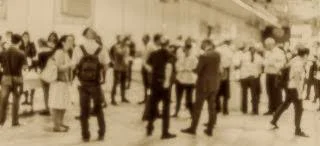Call for Participation
2nd Annual Learning Science Workshop
Research and Innovation for Enhancing Achievement and Equity
June 22-23
Carnegie Mellon University
Pittsburgh PA
Applications Due May 5, 2013
No Cost To Attend
Overview
LearnLab, an NSF Science of Learning Center (SLC) at Carnegie Mellon and the University of Pittsburgh, has an exciting summer research opportunity available to early career researchers in the fields of psychology, education, computer science, human-computer interfaces and language technologies.
The workshop is targeted to senior graduate students, post-docs and early career faculty. The workshop seeks broad participation, including members of underrepresented groups as defined by NSF (African American, Hispanic, Native American) who may be considering a research or faculty position in the learning sciences.
This two-day workshop immediately precedes the LearnLab Summer School (
www.learnlab.org/opportunities/summer/). Our research theme is the
research and innovation for enhancing achievement and equity, including these five areas:
· 21st Century Skills, Dispositions, and Opportunities. Re-examining the goals of education and assessment and considering transformative changes in how and where learning occurs.
The substantive focus of the workshop is the use of current research and innovations to enhance achievement and equity at all levels of learning. Activities will include demonstrations of the diverse set of ongoing learning sciences research projects at LearnLab, and poster presentations or talks by participants. Participants will also meet with LearnLab faculty in research groups and various informal settings. We will provide information about becoming a part of the Carnegie Mellon or University of Pittsburgh learning science community.
In addition to these substantive themes, the workshop will provide participants with opportunities for professional development and the chance to gain a better understanding of the academic career ladder. These include mentoring that focuses on skills, strategies and "insider information" for career paths. Sessions will include keynote speakers and LearnLab senior faculty discussing professional development topics of interest to the attendees. These may include the tenure and promotion process, launching a research program, professionalism, proposal writing, among other topics. There is no cost to attend this workshop
We are very pleased to announce that the workshop will have two distinguished keynote speakers:
Nora S. Newcombe, Ph.D. is the James H. Glackin Distinguished Faculty Fellow and Professor of Psychology at Temple University. Dr. Newcombe is the PI of the Spatial Intelligence and Learning Center (SILC), headquartered at Temple and involving Northwestern, the University of Chicago and the University of Pennsylvania as primary partners. Dr. Newcombe was educated at Antioch College, where she graduated with a major in psychology in 1972; and at Harvard University, where she received her Ph.D. in Psychology and Social Relations in 1976. She taught previously at Penn State University.
A nationally recognized expert on cognitive development, Dr. Newcombe's research has focused on spatial development and the development of episodic and autobiographical memory. Her work has been federally funded by NICHD and the National Science Foundation for over 30 years. She is the author of numerous scholarly chapters and articles on aspects of cognitive development, and the author or editor of five books, including Making Space: The Development of Spatial Representation and Reasoning (with Janellen Huttenlocher) published by the MIT Press in 2000.
Tammy Clegg, Ph.D. is an assistant professor in the College of Education with a joint appointment in the College of Information Studies at the University of Maryland. She received her PhD in Computer Science at Georgia Tech in 2010 and her Bachelor of Science in Computer Science from North Carolina State University in 2002. From 2010-2012 Tamara was a postdoctoral fellow at the University of Maryland with the Computing Innovations Fellows program. Her work focuses on developing technology to support life-relevant learning environments where children engage in science in the context of achieving goals relevant to their lives. Kitchen Chemistry is the first life-relevant learning environment she designed along with colleagues at Georgia Tech. In Kitchen Chemistry, middle-school children learn and use science inquiry to make and perfect dishes. Clegg uses participatory design with children to design these new technologies. Her work currently includes creating new life-relevant learning environments (e.g., Sports Physics, Backyard Biology) to understand how identity development happens across these environments. From this analysis, she aims to draw out design guidelines for life-relevant learning activities and technology in various contexts (e.g., sports, gardening).
About LearnLab
LearnLab is funded by the National Science Foundation (award number SBE-0836012). Our center leverages cognitive theory and computational modeling to identify the instructional conditions that cause robust student learning. Our researchers study
robust learning by conducting
in vivo experiments in math, science and language courses. We also support collaborative primary and secondary analysis of learning data through our open data repository
LearnLab DataShop, which provides data import and export features as well as advanced visualization, statistical, and data mining tools.
The results of our research are collected in our
theoretical wiki which currently has over 400 pages. It also includes a list of
principles of learning which are supported by learning science research. The wiki is open and freely editable, and we invite you to learn more and contribute.
Application Process
Applicants should email their CV,
this demographic form, a proposed presentation title and abstract, and a brief statement describing their research interests to Jo Bodnar (
jobodnar@cs.cmu.edu) by May 5, 2013. Please use the subject
Application for LearnLab Summer Workshop 2013. Upon acceptance
, we will let you know if you have been selected for a talk or poster presentation.
Costs
There is no registration fee for this workshop. However, attendance is limited so early applications are encouraged. Scholarships for travel are available. Scholarships will be awarded based on your application, including your research interests, future plans, and optional recommendation letter.













